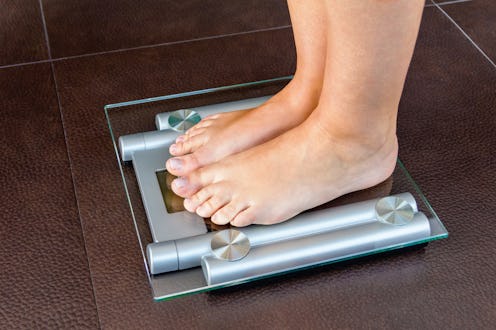News
Can a School Really Force You To Gain Weight?

One Yale University student loaded up on carbs, ate ice cream twice a day, and scarfed down Cheetos. No, it wasn't finals week. It was an attempt to appease campus health officials who she says threatened to kick her out if she didn't gain weight. Yes, you read that right. Officials became worried over Frances Chan's health, saying her low weight put her at risk. Yale University cited the student's low body mass index as the primary cause for concern, and required weekly weigh-ins and urine tests to check for a possible eating disorder.
Chan, who's 5'2" and 92 lbs., attributes her weight and frame to genetics, saying her parents and grandparents are the same way. In an essay published by the Huffington Post, the 20-year-old details her ordeal with nurses, mental health professionals, and nutritionists who all told her the same thing: you're too thin. One clinician told her they would put her on medical leave if she didn't cooperate, saying, "If it were up to the administration, school would already be out for you. I'm just trying to help."
When Chan gained two pounds, school officials said it wasn't enough. It's important for universities to take an interest in their students' health, but Yale might have taken it a little too far. To prove her health history, Chan said her pediatrician spoke to campus representatives, and that her parents even sent in her school and medical records from the the fourth grade.
"It felt really bad to be this powerless," Chan told the New Haven Register. "I used elevators instead of walking up stairs. But I don’t really gain any weight.
After months of back and forth with the school's health center, the university finally relented on Friday, agreeing that the third year history major doesn't have an eating disorder and they "made a mistake," according to a post from Chan's Facebook:
Just visited Yale Health with my parents and met with a new doctor. She apologized repeatedly for the "months of anguish" I went through and admitted that BMI is not the end all be all. She also looked at my medical records since freshman year (which the previous clinician had not done) and noted that she saw that my weight had remained around the same. So she trusts that I do not have an eating disorder and admitted that "we made a mistake." She also does not want me to feel uncomfortable coming to Yale Health if I get a flu or something. I do still have to see them, but at most once a semester.
While Yale is prohibited by federal health regulations from discussing any individual's care, a university spokesperson tells Bustle the school's priority is the well being of its students.
"Yale provides exceptional health care services, and the health and welfare of all of our students is our primary concern," Yale's press secretary Tom Conroy says.
It seems this isn't the first time the university has faced scrutiny over its health policies, as Chan points out in her HuffPo piece. A 2010 feature in the Yale Herald, the student-run newspaper, highlighted the obstacles faced by other undergraduates with low BMIs. One student named Alice had to undergo weekly consultations with health staff to analyze her weight and discuss her "progress."
...this policy of flagging—and potentially penalizing—students with suspiciously low BMIs stretches past the athlete population. For a non-athlete, the BMI cutoff is in the territory of 16 [is] considerably harsher than it would be for an athlete.
But Yale isn't the only school with these kinds of policies. Universities like Columbia require a medical leave for people with eating disorders, based on consultations with the school's Eating Disorders Team of Health Services and the Dean of Students. Like Yale, if the student fails to comply, they're out of the school. At other colleges like Duke or Bowling Green, students cited with concerns are ordered to see a therapist, a dietitian, and physician for assessment, then decisions are made based on formal recommendations.
Image: Fotolia